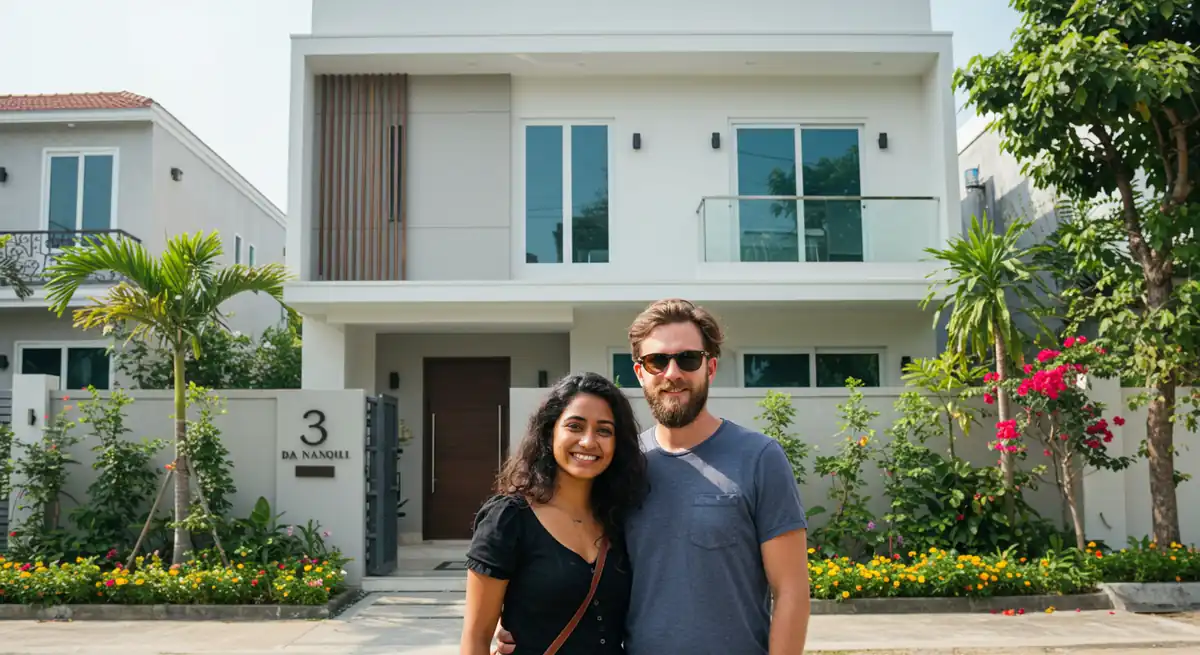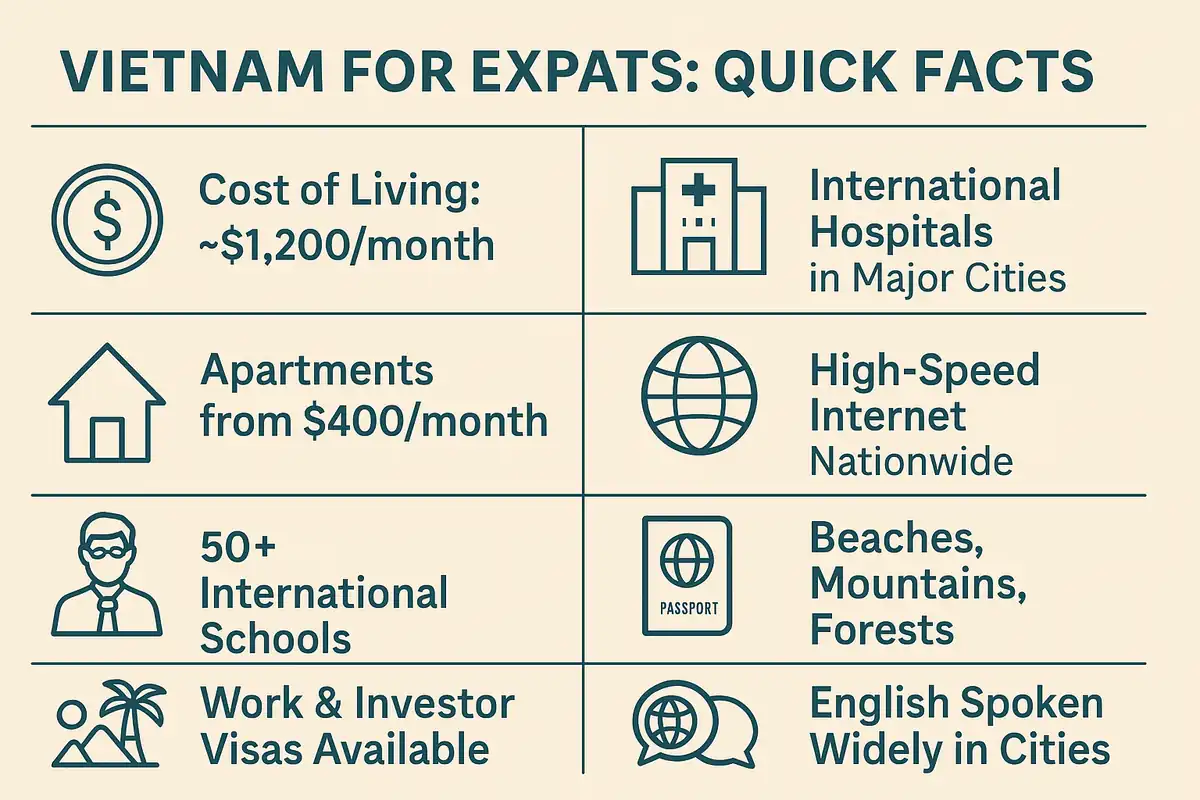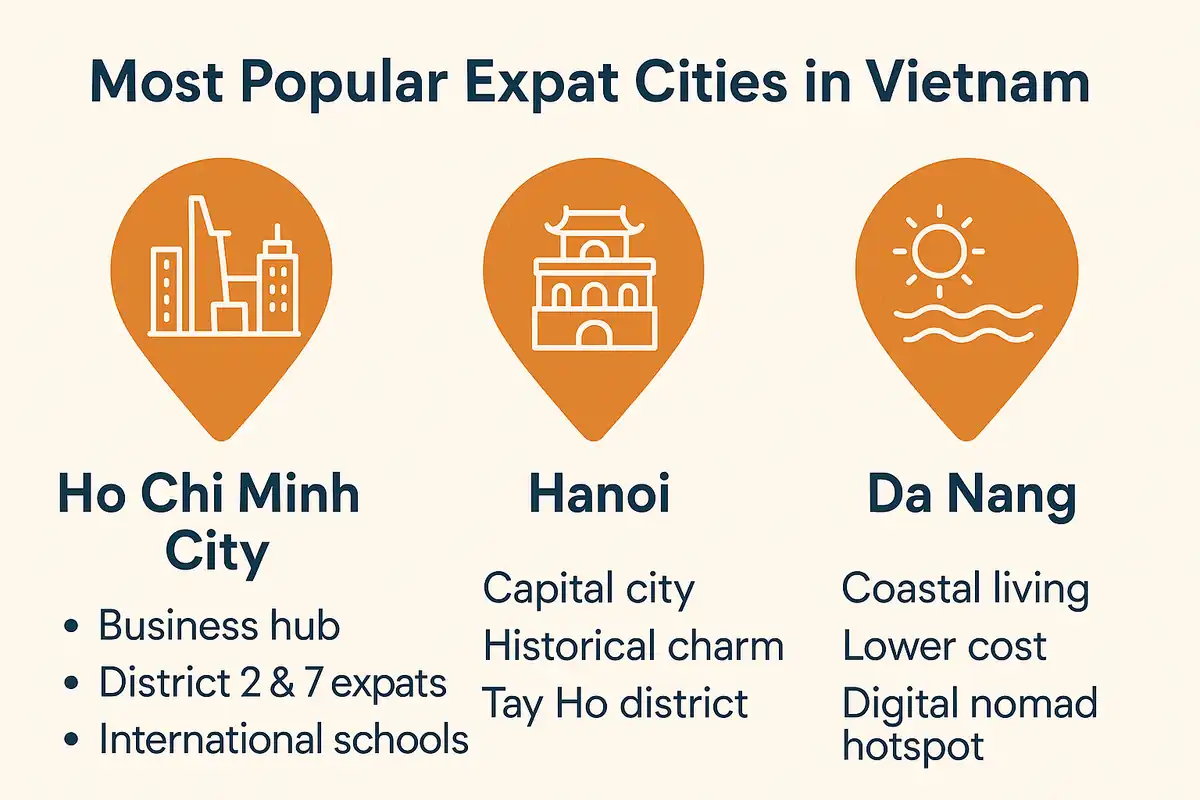
Why Vietnam is an Ideal Destination for Expats
Thinking of relocating to Vietnam? Discover why Vietnam is becoming a top destination for expatriates worldwide. Explore its vibrant lifestyle, safe and welcoming environment, and excellent living standards.
Vietnam: An Emerging Haven for Global Citizens
In recent years, Vietnam has solidified its reputation as one of the most attractive destinations for expatriates in Asia. With its dynamic cities, welcoming culture, stable economy, and rising global profile, Vietnam offers a unique combination of opportunity, comfort, and quality of life.
For individuals and families seeking a fresh start or a new chapter abroad, Vietnam stands out as a destination not only rich in heritage but also full of promise for a fulfilling, long-term life abroad.
Why Vietnam Appeals to the International Community
Vietnam’s appeal to foreigners is multifaceted, combining traditional charm with the conveniences of modern life. The country offers:
Affordable yet High-Quality Living
Compared to Western countries or regional hubs like Singapore or Hong Kong, Vietnam provides a more accessible lifestyle without compromising on comfort or convenience.
Safe and Peaceful Society
Vietnam is known for its political stability, low crime rate, and social harmony—making it ideal for families and professionals seeking peace of mind.
Welcoming and Hospitable Locals
The Vietnamese are warm, respectful, and eager to engage with international residents, creating an inclusive atmosphere that helps newcomers feel at home.
Strategic Location and Connectivity
Located in the heart of Southeast Asia, Vietnam offers convenient travel links to major regional and global cities.
A Thriving Expat Ecosystem
From business executives and retirees to digital nomads and entrepreneurs, the expatriate community in Vietnam is diverse, vibrant, and continually growing.
Quality of Life in Vietnam
Vietnam offers a balanced lifestyle that blends urban energy with natural tranquility. Whether one chooses to live in the heart of bustling Ho Chi Minh City, the cultural capital of Hanoi, or the coastal serenity of Da Nang and Nha Trang, expats enjoy access to:
Modern Infrastructure
High-speed internet, international schools, world-class hospitals, and a growing number of luxury residences and serviced apartments.
Cultural Richness and Leisure
Vietnam’s unique blend of heritage, art, cuisine, and festivals provides continuous discovery and engagement.
Environmental Diversity
From scenic mountains and rice terraces to pristine beaches and tropical forests, the country offers diverse landscapes for exploration and relaxation.
Housing and Accommodation for Expats
Vietnam’s real estate market has evolved to meet international standards, offering a wide range of residential options tailored to expat preferences:
Serviced Residences
Ideal for short- and long-term stays, featuring full amenities, housekeeping, and prime locations.
Modern Condominiums
Equipped with swimming pools, fitness centers, and security, these residences are especially popular among young professionals and couples.
Private Villas and Townhouses
Suited for families or those seeking privacy, often located in suburban or peaceful areas with green surroundings.
Rental prices vary based on location and property type, but in general, expats find housing in Vietnam to be exceptionally good value for money. For detailed rental market insights, see our guide on Navigating HCMC’s Rental Market.
Cost of Living in Vietnam
Vietnam consistently ranks among the most cost-effective countries for expatriates. Below is an overview of typical monthly expenses:

Monthly Living Costs
- Rent (1BR in city center): $400 – $800
- Utilities & Internet: $50 – $100
- Food & Dining: $150 – $250
- Transportation: $30 – $70
- Leisure & Activities: $100 – $200
A comfortable lifestyle can be maintained on a budget of approximately $1,000 – $1,500 per month, depending on individual preferences.
Cost Comparison
- 50-70% lower than Singapore or Hong Kong
- 30-40% lower than Thailand or Malaysia
- 20-30% lower than the Philippines
- Comparable to Indonesia for most expenses
Banking and Financial Services for Expats
Setting up banking services in Vietnam is essential for any long-term resident, and the process has become increasingly streamlined for expatriates.
International and Local Banking Options
- International banks: HSBC, ANZ, and Standard Chartered offer English-speaking services and familiar banking products
- Local banks: Vietcombank, Techcombank, and VPBank provide excellent services to foreign residents with extensive ATM networks
Opening a Bank Account
- Required documents: Passport, visa, temporary residence card, and proof of address (rental contract or utility bill)
- Additional requirements: Some banks may request an employment letter or business license
- Processing time: One to three business days
- Minimum deposit: Typically $100 to $500 depending on the bank and account type
Money Transfers and Foreign Exchange
- International transfers: Services like Wise, Remitly, or Western Union offer faster and more cost-effective transfers than traditional banking
- Foreign exchange regulations: Vietnam has strict regulations, so keep records of all international transfers
- Payment methods: Credit cards are becoming more widely accepted in urban areas, though cash remains dominant in many situations
Legal Requirements and Documentation
Understanding Vietnam’s legal requirements is crucial for a smooth transition and long-term compliance.
Visa and Work Permits
- Tourist visas: Suitable for short visits
- Business visas: For those exploring opportunities
- Work permits: Required for employed individuals
- Application process: Requires criminal background check, educational certificates, health checks, and employment contracts
- Document preparation: Foreign documents must be apostilled or legalized and translated into Vietnamese
- Processing time: Four to eight weeks for work permits
Temporary Residence Card
- Benefits: Multiple entries and exits, official identification within Vietnam
- Requirements: Valid passport, appropriate visa, health insurance, proof of accommodation
Tax Obligations
- Residency status: Tax residents (staying more than 183 days per year) must pay personal income tax on Vietnamese-sourced income
- Tax rates: Progressive scale from 5 to 35 percent
- Professional advice: Consulting with a local tax advisor is recommended for compliance and optimization
Transportation in Vietnam
Getting around Vietnam efficiently requires understanding the various transportation options available to expats.
Daily Urban Transportation
- Motorbikes: The most practical form of daily transportation in cities
- Licensing: Foreigners can operate motorbikes with a Vietnamese driving license or international driving permit
- Insurance: Mandatory and relatively inexpensive ($20 to $50 annually)
Ride-Hailing and Taxis
- Ride-hailing services: Grab offers both motorbike and car services with English-language apps and cashless payments
- Traditional taxis: Available but sometimes less reliable for pricing
Public Transportation
- Ho Chi Minh City: Developing metro lines
- Hanoi: Established public bus system
- Infrastructure: Both cities investing heavily in modern public transportation
Long-Distance Travel
- Domestic flights: Excellent connections between major cities via Vietnam Airlines, VietJet Air, and Bamboo Airways
- Railway system: Scenic and comfortable, particularly the Hanoi to Ho Chi Minh City route
- Long-distance buses: Most economical option connecting virtually every destination
Smooth Relocation: What Expats Should Know
Relocating to Vietnam is relatively straightforward, particularly with the support of local experts or relocation services. Key considerations include:
Visa and Immigration
Vietnam offers various visa types, including work permits, investor visas, and long-term residence permits. Legal consultation is recommended for compliance and peace of mind.
Healthcare and Insurance
Vietnam is home to numerous international-standard hospitals and clinics, especially in major cities. Private health insurance is advisable.
Cultural Integration
Learning basic Vietnamese and understanding social customs greatly enhances the living experience and strengthens community connections.
Networking and Community
Expats can easily connect through online platforms, coworking spaces, or professional and social events tailored to the international community.
Popular Expat Destinations

Ho Chi Minh City
Vietnam’s largest city offers:
- Dynamic business environment with multinational corporations
- International schools and healthcare facilities
- Vibrant nightlife and dining scene
- Expat communities in District 2 and District 7
Hanoi
The capital city provides:
- Rich cultural heritage and historical sites
- Government and diplomatic opportunities
- Traditional charm with modern conveniences
- Growing expat community in Tay Ho district
Da Nang
Coastal living with:
- Beautiful beaches and outdoor activities
- Lower cost of living than major cities
- Digital nomad friendly environment
- International airport with good connectivity
Working in Vietnam
Vietnam’s robust economic growth—consistently above 6% annually pre-pandemic and rapidly recovering since—has created a dynamic job market attractive to international professionals. The country’s strategic pivot toward high-tech industries, manufacturing, and services has opened numerous opportunities for expatriates with specialized skills and experience. Whether you’re seeking employment with multinational corporations, local companies, or considering entrepreneurial ventures, Vietnam offers a supportive environment with competitive compensation relative to the cost of living.
Job Market
Vietnam’s growing economy offers opportunities in:
- Technology and IT sectors
- Manufacturing and export industries
- Education and training services
- Tourism and hospitality management
Business Environment
- Favorable tax policies for foreign businesses
- Growing startup ecosystem in major cities
- Government support for foreign investment
- Strategic location for regional business expansion
Work Permits
- Professional work permits for qualified individuals
- Business visas for entrepreneurs and investors
- Teaching permits for education professionals
- Simplified processes for certain industries
Education for Expat Families
For expatriate families, education is often a primary concern when relocating. Fortunately, Vietnam has experienced significant growth in its international education sector over the past decade, with schools offering world-class facilities and globally recognized curricula. These institutions provide continuity for children transitioning from other countries while also offering unique opportunities to experience Vietnamese culture. From preschool through high school, the educational landscape in Vietnam has evolved to meet the diverse needs of the international community.
International Schools
Vietnam offers excellent international education options:
- American, British, and International curricula
- High academic standards and modern facilities
- Multilingual programs and cultural diversity
- University preparation and global recognition
School Locations
- Ho Chi Minh City: 20+ international schools
- Hanoi: 15+ international schools
- Da Nang: Growing international school options
- Other cities: Limited but expanding options
Healthcare and Wellness
Medical Facilities
Vietnam’s healthcare system includes:
- International hospitals with English-speaking staff
- Modern medical equipment and facilities
- Affordable treatment costs compared to Western countries
- Traditional medicine options alongside modern healthcare
Health Insurance
- International coverage recommended for expats
- Local insurance options available at lower costs
- Comprehensive coverage for major medical expenses
- Emergency evacuation services available
Cultural Experience and Lifestyle
Vietnamese Cuisine
- World-renowned street food and restaurants
- Fresh ingredients and healthy options
- Affordable dining at all price points
- International cuisine widely available
Festivals and Events
- Tet (Lunar New Year): Vietnam’s biggest celebration
- Mid-Autumn Festival: Family-oriented celebrations
- International events: Music, film, and cultural festivals
- Local traditions: Rich cultural heritage to explore
Outdoor Activities
- Beach destinations: Long coastline with beautiful beaches
- Mountain trekking: Northern highlands and national parks
- Water sports: Diving, snorkeling, and water activities
- Urban recreation: Parks, sports facilities, and fitness centers
Seasonal Living Guide
Understanding Vietnam’s diverse climate patterns is essential for making the most of your expat experience and planning your activities throughout the year. Vietnam stretches over 1,000 miles from north to south, creating distinct climate zones that each offer unique advantages during different seasons.
Northern Vietnam (Hanoi Region)
- Spring (Feb-Apr): Mild temperatures, occasional light rain; perfect for exploring mountainous regions
- Summer (May-Aug): Hot and humid with afternoon thunderstorms; ideal for highland trekking
- Autumn (Sep-Nov): Best season with comfortable temperatures, clear skies, and stunning fall colors
- Winter (Dec-Jan): Surprisingly cool, temperatures sometimes below 10°C in mountainous areas
Central Vietnam (Da Nang, Hoi An)
- Dry Season (Feb-Aug): Excellent beach weather, though temperatures intensify during summer
- Rainy Season (Sep-Jan): Heavy downpours, occasional typhoons, cooler temperatures, fewer tourists
Southern Vietnam (Ho Chi Minh City)
- Dry Season (Dec-Apr): Most comfortable weather with lower humidity and minimal rainfall
- Wet Season (May-Nov): Daily afternoon rains, high humidity, lush green landscapes, fewer crowds
Practical Tips
- Wardrobe Planning: Lightweight clothing for dry seasons; waterproof gear for rainy seasons
- Seasonal Travel: Many expats travel within Vietnam seasonally—summers in cooler northern mountains, winters on southern beaches
- Air Quality Awareness: Northern cities often experience haze during dry months; consider air purifiers for your home
Technology and Communications Setup
Establishing reliable technology and communications infrastructure is crucial for modern expats, whether you’re working remotely, running a business, or simply staying connected with family and friends abroad. Vietnam’s telecommunications infrastructure has improved dramatically in recent years, offering expats multiple high-quality options.
Mobile Services
- Major Providers: Viettel (best coverage), Mobifone (urban focus), Vinaphone (data-friendly)
- Setup Requirements: Passport and local address (tourist SIMs available for short-term)
- Data Plans: Unlimited plans range from $10-$25 monthly with reliable 4G/5G in urban areas
Home Internet
- Connection Type: Fiber optic (50-500 Mbps)
- Major Providers: FPT Telecom, Viettel, VNPT
- Installation Time: 3-7 days after application
- Reliability: Generally sufficient for video conferencing, streaming, and remote work
Essential Apps for Vietnam
- Transportation: Grab (rides, food delivery, packages)
- Shopping: Shopee, Lazada (English interfaces available)
- Communication: Zalo (Vietnam’s primary messaging platform)
- Translation: Google Translate with camera functionality
- Food Delivery: Grab Food, Now, Baemin
Connectivity Tips
- VPN Services: Essential for accessing region-restricted content and secure connections
- International Calling: WhatsApp, Skype, and Viber work reliably
- Streaming Services: Most international platforms accessible (some require VPN)
- Banking Apps: Available from major Vietnamese banks (interfaces often in Vietnamese only)
Conclusion: Vietnam – A Place to Belong
Vietnam is no longer a hidden gem; it is a rising star on the global stage. For expats seeking more than just a destination—for those seeking belonging, opportunity, and balance—Vietnam offers an exceptional quality of life in a country that is forward-looking, hospitable, and full of life.
Whether you’re planning to work, retire, invest, or simply explore a new way of living, Vietnam warmly opens its doors to those ready to embrace its charm and potential.
Ready to start your journey in Vietnam?
Contact our expert team for personalized guidance on relocation, housing options, and full support for your move to Vietnam.